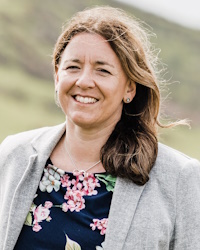T: 01822 851370 E: [email protected]
Visit RSN Survey about life in rural England to find out more.
Digital Shift Could Deepen Inequality
 New analysis from Age UK has found that 2.4 million older people in the UK — nearly one in five (19%) — have limited use of the internet, going online less than once a month or not at all.
New analysis from Age UK has found that 2.4 million older people in the UK — nearly one in five (19%) — have limited use of the internet, going online less than once a month or not at all.
The charity warns that a “digital by default” approach to essential services risks excluding millions, especially without a clear, enforceable guarantee that offline options will always be available. It is calling on the Government to ensure that in-person and assisted digital support remains in place for services such as NHS appointments, Blue Badge applications, and council services.
The figures show that some groups are even more likely to have limited internet use — rising to 32% for older Black people, 30% for those living alone, 26% for older Asian people, and 22% for older women and those struggling financially.
In the past year, 920,000 older people (7%) have reduced their internet use, reinforcing earlier Age UK research showing that some who go online do not always stay there in later life. In addition:
- 6 million (12%) older people do not use a mobile phone at all.
- 3 million (33%) do not use a smartphone.
- 4 million (31%) say poor IT skills keep them offline.
- 9 million (22%) say a lack of trust in the internet is a barrier.
Age UK has delivered a 173,949-signature petition to 10 Downing Street, highlighting the everyday struggles some older people face when key services are only available digitally. Some told the charity they feel belittled or pressured into going online, while others spoke of being unable to arrange GP appointments or manage essential tasks.
Caroline Abrahams CBE, Charity Director at Age UK, said:
"Through our petition, older people who aren't able or choose not to be online told us they were deeply worried about being locked out of the essential services they depend on… Whether you agree with that or not, there’s no doubt in our minds at Age UK that a poorly planned and delivered transition to digital by default would pose very real risks to the health, wellbeing, finances and inclusion of millions of older people: for their sake above all we have to get it right".
While many older people embrace technology, Age UK says some will always need offline options. The charity supports initiatives to help those who wish to get online but insists that offline alternatives remain essential to ensure equal access for everyone.
More information, including Age UK’s full response to the Government’s Digital Inclusion Plan, is available at: https://www.ageuk.org.uk/our-impact/programmes/digital-skills/digital-champions/
 |
Kerry Booth, Chief Executive of the Rural Services Network, said:
|
 Passionate about closing the digital divide? Join us on Tuesday 16 September, Online from 1.30–3.30pm, for our National Rural Conference session on Rural Connectivity. Hear from experts, share your experience, and help shape solutions. RSN members can book here now.
Passionate about closing the digital divide? Join us on Tuesday 16 September, Online from 1.30–3.30pm, for our National Rural Conference session on Rural Connectivity. Hear from experts, share your experience, and help shape solutions. RSN members can book here now.



